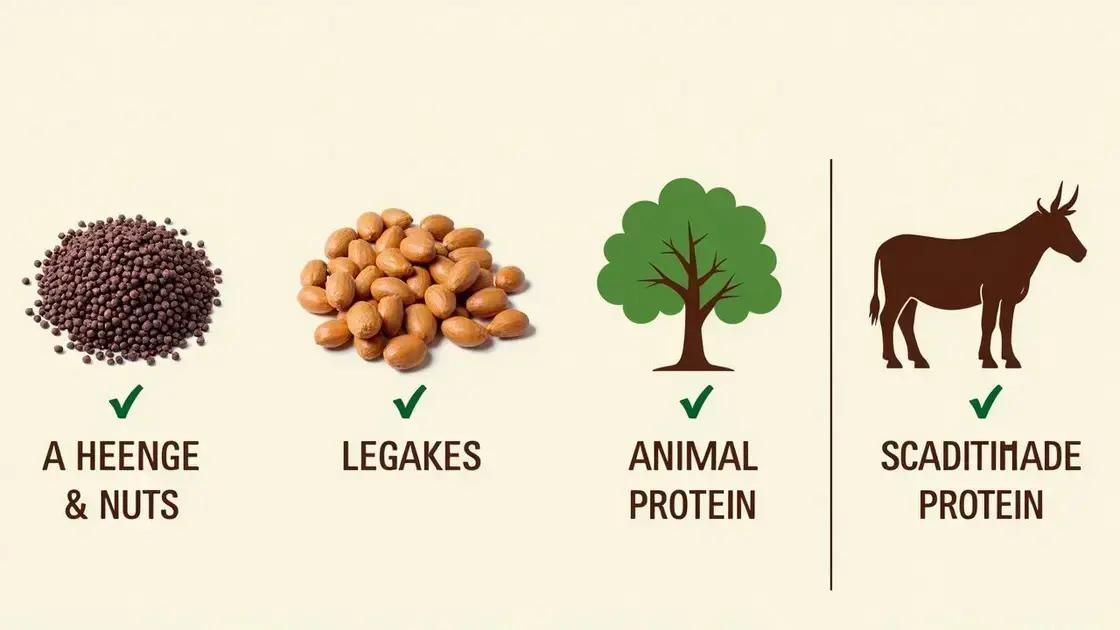The role of sustainable protein sources in men’s diets is vital for improving health and supporting environmental sustainability. Sustainable proteins, including plant-based options and responsibly sourced animal products, offer numerous health benefits such as lower saturated fat content, essential nutrients, and reduced environmental impact compared to traditional animal proteins.
The role of sustainable protein sources in men’s diets has become increasingly crucial as we seek healthier and more environmentally friendly options. With growing concerns over the environmental impact of traditional protein sources, men are encouraged to consider diverse, sustainable alternatives. This article will delve into the various types of sustainable proteins, their health benefits, and practical ways to incorporate them into daily meals.
Understanding Sustainable Protein Sources

Understanding sustainable protein sources is essential for making healthier dietary choices. Sustainable proteins come from sources that have a lower environmental impact compared to traditional animal proteins. They include plant-based options and certain types of responsibly sourced animal proteins.
Plant-Based Protein Sources
Plant-based proteins are often rich in fiber, vitamins, and minerals. Common examples are beans, lentils, chickpeas, nuts, and seeds. These options not only reduce greenhouse gas emissions but also use less water and land than animal farming.
Responsibly Sourced Animal Proteins
Some animal proteins can be considered sustainable if they come from farms that practice ethical and eco-friendly methods. This includes grass-fed beef, pasture-raised chicken, and sustainably caught fish. These practices help ensure that animal farming is less harmful to the environment.
The Importance of Diversity
Incorporating a variety of sustainable protein sources in men’s diets not only enhances nutritional intake but also reduces dependence on any single food type. This diverse approach helps support overall health and well-being.
Choosing sustainable protein sources is crucial for mitigating climate change and promoting biodiversity. As more individuals recognize the benefits of these proteins, their impact on health and the planet can increase significantly.
Health Benefits of Sustainable Proteins

Sustainable proteins offer numerous health benefits that can enhance overall well-being. First, plant-based proteins such as beans, lentils, and nuts are packed with essential nutrients. They are high in fiber, which helps maintain digestive health and prevents constipation.
Rich in Vitamins and Minerals
These proteins are also rich in vitamins and minerals like iron, calcium, and B vitamins. Incorporating sustainable proteins into men’s diets can ensure a balanced intake of these nutrients, supporting energy levels and metabolic functions.
Heart Health
Sustainable proteins, particularly those from plants, are known to improve heart health. They are lower in saturated fat than traditional animal proteins, which helps reduce cholesterol levels and lower the risk of heart disease.
Weight Management
Being rich in fiber and protein, sustainable food sources can promote a feeling of fullness. This helps with weight management, reducing the tendency to overeat and making it easier to maintain a healthy weight.
In summary, sustainable proteins contribute to better health by enhancing nutritional intake, promoting heart health, and supporting weight management. As men increase their consumption of these proteins, they may notice significant positive changes in their overall health.
Sustainable Proteins vs. Traditional Options

Sustainable proteins and traditional animal proteins differ significantly in terms of environmental impact and health benefits. Traditional options, such as red meat and processed meats, often require large amounts of resources, like water and land, and contribute to greenhouse gas emissions.
Environmental Impact
Producing traditional animal proteins can lead to deforestation and depletion of natural resources. In contrast, sustainable proteins, which include plant-based options, typically have a much smaller ecological footprint. For example, growing legumes or grains uses less water and releases fewer pollutants compared to raising livestock.
Health Considerations
When it comes to health, traditional animal proteins can be high in saturated fats, which may contribute to heart disease and obesity. Sustainable proteins, particularly from plants, are generally lower in saturated fats and higher in beneficial nutrients such as fiber, vitamins, and antioxidants.
Cost and Accessibility
In some cases, sustainable proteins can be more cost-effective than traditional options. Although prices may vary depending on the source and location, the growing demand for sustainable food options is leading to more availability in supermarkets and local markets.
Additionally, the focus on ethical farming practices means that sustainable proteins are often grown or raised in ways that promote animal welfare, creating a better product for consumers who care about these issues.
Practical Tips for Men to Include Sustainable Proteins

Incorporating sustainable proteins into men’s diets can be easy and enjoyable. Here are some practical tips to help make the switch:
1. Experiment with Plant-Based Meals
Start by trying out plant-based recipes. Use ingredients such as lentils, quinoa, beans, and chickpeas. These foods can be the main part of meals or added to salads and soups for extra nutrition.
2. Replace Meat Gradually
If you are used to eating meat at every meal, consider reducing consumption slowly. Try having one meatless day per week and increase it over time. This way, your body can adjust while you explore new sustainable options.
3. Choose Sustainable Seafood
When selecting seafood, look for labels that indicate the fish is sustainably caught or farmed. Options like wild-caught salmon or shrimp can be healthier and more eco-friendly than many farmed fish.
4. Snack Smart
Opt for sustainable protein-rich snacks such as nuts, seeds, and hummus with veggies. These options are not only nutritious but also quick and easy to prepare.
By integrating these practical tips into daily life, men can embrace sustainable proteins, leading to healthier diets and a positive impact on the environment.
The Importance of Sustainable Proteins in Men’s Diets
Integrating sustainable protein sources into men’s diets is not only beneficial for health but also crucial for the environment. As we’ve explored, traditional animal proteins often come with high environmental costs and health risks.
By choosing sustainable options such as plant-based proteins and responsibly sourced animal products, men can enjoy improved heart health, better weight management, and enhanced nutrient intake.
Practical tips for incorporating these proteins into daily meals make it easier to transition to a more sustainable diet. Not only can this choice lead to personal health benefits, but it also supports a healthier planet.
Embracing sustainable proteins is a powerful way for men to take control of their diets while contributing positively to the environment. Your choices in nutrition can make a significant difference for yourself and future generations.
FAQ – Frequently Asked Questions about Sustainable Proteins in Men’s Diets
What are sustainable protein sources?
Sustainable protein sources include plant-based options like beans, lentils, and nuts, as well as responsibly sourced animal proteins such as grass-fed beef and wild-caught fish.
Why should I consider sustainable proteins over traditional animal proteins?
Sustainable proteins typically have a lower environmental impact and offer health benefits such as lower saturated fat content and higher nutrient density.
How can I incorporate more sustainable proteins into my diet?
Start by experimenting with plant-based meals, gradually reducing meat consumption, choosing sustainable seafood, and opting for protein-rich snacks like nuts and hummus.
What are the health benefits of sustainable proteins?
Sustainable proteins can support heart health, help with weight management, and provide essential vitamins and minerals that contribute to overall well-being.
Are sustainable proteins more expensive than traditional options?
While prices can vary, many sustainable protein sources can be cost-effective. As demand increases, they are becoming more accessible in stores.
How do sustainable proteins benefit the environment?
Sustainable proteins typically require fewer natural resources and contribute less to greenhouse gas emissions compared to traditional protein sources, promoting biodiversity and reducing pollution.













